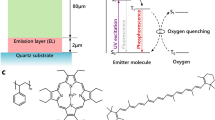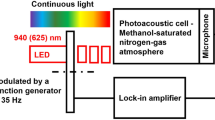Abstract
FORD1 has reported that when nylon polymer films are irradiated in the presence of oxygen, a new absorption band develops around 2900 A., which increases in intensity on storage in the dark and is reduced on re-irradiation to about the pre-storage value. His explanation of this phenomenon with nylon films was that oxygen was directly responsible for this effect. We have recently been investigating this stepwise ‘post-irradiation effect’ and have found that it occurs with several other polymer films, is no less prominent in nitrogen than in oxygen, and is not restricted to a particular absorption band. It therefore seems doubtful whether these changes in absorption spectra are the result of the reaction of the polymer with oxygen.
This is a preview of subscription content, access via your institution
Access options
Subscribe to this journal
Receive 51 print issues and online access
$199.00 per year
only $3.90 per issue
Buy this article
- Purchase on Springer Link
- Instant access to full article PDF
Prices may be subject to local taxes which are calculated during checkout
Similar content being viewed by others
References
Ford, R. A., Nature, 176, 1023 (1955).
Egerton, G. S., J. Soc. Dyers Col., 65, 764 (1949).
Author information
Authors and Affiliations
Rights and permissions
About this article
Cite this article
EGERTON, G., ROACH, A. Photochemistry of Polymer Films. Nature 180, 189–190 (1957). https://doi.org/10.1038/180189a0
Issue Date:
DOI: https://doi.org/10.1038/180189a0
Comments
By submitting a comment you agree to abide by our Terms and Community Guidelines. If you find something abusive or that does not comply with our terms or guidelines please flag it as inappropriate.



